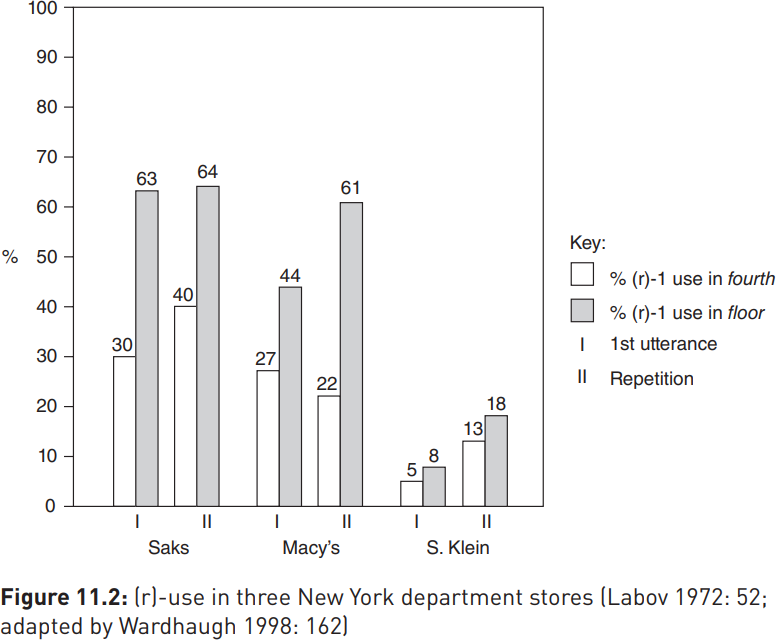


 Grammar
Grammar
 Tenses
Tenses
 Present
Present
 Past
Past
 Future
Future
 Parts Of Speech
Parts Of Speech
 Nouns
Nouns
 Verbs
Verbs
 Adverbs
Adverbs
 Adjectives
Adjectives
 Pronouns
Pronouns
 Pre Position
Pre Position
 Preposition by function
Preposition by function 
 Preposition by construction
Preposition by construction
 Conjunctions
Conjunctions
 Interjections
Interjections
 Grammar Rules
Grammar Rules
 Linguistics
Linguistics
 Semantics
Semantics
 Pragmatics
Pragmatics
 Reading Comprehension
Reading Comprehension|
Read More
Date: 8-6-2022
Date: 2023-08-21
Date: 2023-12-08
|
Rapid anonymous observation
Ingenious techniques such as rapid anonymous observation were used in early variationist studies to overcome the Observer’s Paradox, i.e. the problem of obtaining ‘natural speech’ from informants who know they are under investigation. Sociolinguists have now largely abandoned the notion of ‘natural speech’, on the grounds that all speech is designed with an audience in mind.
The results, when collated and analyzed, showed a remarkable correlation between the status of the store and linguistic behavior, with most use of the prestigious (r)-1 variants occurring, in both environments, in the high-status Saks store and fewest in the lowest-status store, Klein’s. (r)-1 use increased consistently in the repeated ‘emphatic’ style, suggesting that speakers use more prestige variants when paying more attention to their speech.

Labov’s technique of rapid anonymous observation had overcome the Observer’s Paradox and demonstrated a clear, quantifiable correlation between speech and social status. A question we need to ask here, though, is ‘whose social status?’. For all its advantages, rapid anonymous observation yields very little information about informants themselves, beyond that which can be reasonably guessed, for example sex and approximate age. We therefore know little about the shop assistants’ own socio-economic status but, perhaps surprisingly, there is little reason to suppose that it actually corresponded to that of the stores where they worked: indeed, on one criterion, that of pay level, Macy’s rather than Saks employees were believed to be of highest status. In all likelihood, the shop assistants’ speech was a better reflector of the status of their customers’ status than of the assistants themselves. The assistants, in other words, seemed to be ‘borrowing’ the status of their customers by accommodating to them. As we shall see, the concept of accommodation has important consequences for our understanding of linguistic change.
|
|
|
|
4 أسباب تجعلك تضيف الزنجبيل إلى طعامك.. تعرف عليها
|
|
|
|
|
|
|
أكبر محطة للطاقة الكهرومائية في بريطانيا تستعد للانطلاق
|
|
|
|
|
|
|
العتبة العباسية المقدسة تبحث مع العتبة الحسينية المقدسة التنسيق المشترك لإقامة حفل تخرج طلبة الجامعات
|
|
|